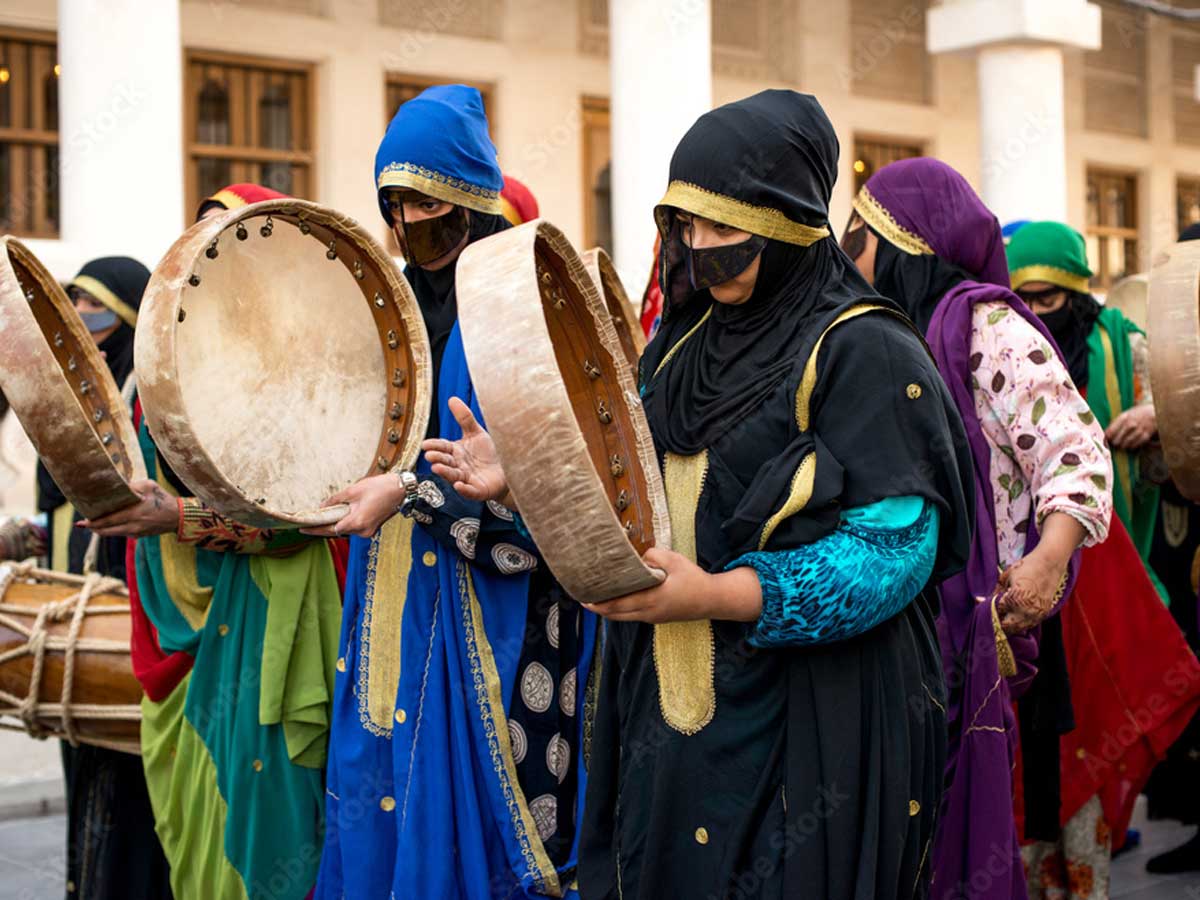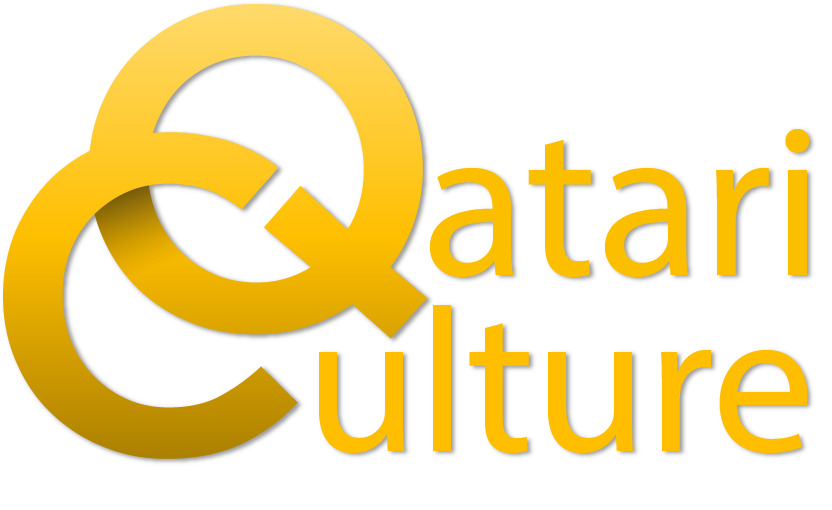Katar, Ein kleines, aber schnell modernisierendes Land auf der arabischen Halbinsel, hält eng an seinem reichen kulturellen Erbe und seiner Traditionen, Trotz seiner modernen Fortschritte und des globalen Einflusses. Diese Traditionen sind tief in der Nation verwurzelt Beduinengeschichte Und Islamische Werte, und sie spielen eine wichtige Rolle bei der Gestaltung des Alltagslebens der Katarischen Menschen. Von Kleidung und sozialen Normen bis hin zu religiösen Praktiken und Festen, Die katarische Kultur ist eine Mischung aus alten Bräuchen und modernen Einflüssen.
In diesem Artikel, Wir werden einige der bekanntesten Aspekte von untersuchen Katarische Kultur und Traditionen, einschließlich Familienwerte, Religiöse Praktiken, Traditionelle Kleidung, Feierlichkeiten, und Etikette. Das Verständnis dieser Traditionen ist für jeden, der in Katar besucht oder lebt, von wesentlicher Bedeutung, Da bieten sie Einblicke in die katarische Lebensweise und wie das Land seine Vergangenheit mit seiner Zukunft in Einklang bringt.
Familienwerte und Struktur
Familie ist der Eckpfeiler von Katarische Gesellschaft. Die Struktur von Familien in Katar ist in der Regel patriarchaler, Mit dem Vater oder dem ältesten Mann spielt eine zentrale Rolle als Leiter des Haushalts. Großfamilien oft zusammenleben oder enge Beziehungen behalten, mit einer starken Betonung der Einheit, Loyalität, und Respekt vor Ältesten. In der katarischen Kultur, In der Familie geht es nicht nur um unmittelbare Verwandte; die erweiterte Familie, einschließlich Großeltern, Tanten, Onkel, und Cousins, spielt eine wesentliche Rolle im Leben des Einzelnen.
Eine der angesehensten Traditionen ist die Freitag Family Treffen, die normalerweise danach stattfinden Freitag (Freitagsgebete). Familienmitglieder kommen zu einer großen Mahlzeit zusammen, Oft mit traditionellen katarischen Gerichten, zu verbinden, aufholen, und verstärken familiäre Bindungen. Diese Versammlungen sind geschätzte Anlässe und sind ein wesentlicher Bestandteil der Aufrechterhaltung starker familiärer Beziehungen.
Die Ehe ist ein weiterer wichtiger Aspekt des Familienlebens in Katarisch. Arrangierte Ehen sind häufig, Obwohl die moderne Kataris mehr Autonomie bei der Auswahl ihrer Partner als in der Vergangenheit haben. Die Ehe in Katar gilt nicht nur als Vereinigung zwischen zwei Personen, sondern auch zwischen zwei Familien, Verstärkung der Idee der Einheit der Familie und der kollektiven Verantwortung.
Die Rolle des Islam in katarischen Traditionen
Islam ist die offizielle Religion Katars und durchdringt jeden Aspekt des Lebens im Land, Von den täglichen Routinen bis zu besonderen Anlässen. Die Werte und Lehren von Islam Gestalt der Moralischer Kompass der katarischen Gesellschaft, und religiöse Praktiken sind tief mit kulturellen Traditionen verflochten. Das Verständnis der Rolle des Islam in der katarischen Kultur ist der Schlüssel, um die Bedeutung vieler Bräuche des Landes zu erfassen.
Katar folgt dem Sunniten Zweig des Islam, und das tägliche Leben Kataris werden von der unterbrochen Fünf tägliche Gebete. Der Ruf zum Gebet, oder Adhan, hallt fünfmal am Tag durch Moscheen im ganzen Land durch die Straßen. Freitagsgebete, bekannt als Freitag, sind besonders wichtig, Da ist es der heiligste Tag der Woche für Muslime. An diesem Tag, Männer versammeln sich in der Moschee für ein Gemeinschaftsgebet und eine Predigt, Während Frauen zu Hause oder in einer Moschee beten können.
Während des Heiliger Monat Ramadan, Kataris beobachtet das Fasten vom Morgengrauen bis Sonnenuntergang, von Nahrung unterhalten, trinken, und andere körperliche Bedürfnisse bei Tageslichtstunden. Ramadan ist eine Zeit zum Nachdenken, Spirituelles Wachstum, und verstärkte Hingabe an den Glauben. Bei Sonnenuntergang, Familien brechen ihr Fasten mit einer Mahlzeit namens namens Iftar, oft beginnen mit Termine und Wasser, folgt der Tradition des Propheten Muhammad.
Eid al-Fitr, Das Festival, das das Ende des Ramadan markiert, Und Eid al-Adha, das Fest des Opfers, sind die beiden wichtigsten islamischen Feiertage in Katar gefeiert. Beide EIDs sind durch kommunale Gebete gekennzeichnet, feiern, Wohltätigkeit geben, und Zeit mit der Familie verbringen. Wohltätigkeit, oder Zakat, ist ein grundlegender Aspekt dieser Feierlichkeiten, Wie der Islam einen starken Schwerpunkt auf die Unterstützung des weniger Glücklichen legt.
Traditionelle katarische Kleidung
Traditionelle Kleidung In Katar reflektiert sowohl das Beduinen -Erbe des Landes als auch seine islamischen Werte der Bescheidenheit. Für Männer, Die Thobe (oder Dandard) ist die häufigste Kleidung. Der Thobe ist lang, fließendes weißes Robe, das von katarischen Männern sowohl formelle als auch ungezwungene Anlässe getragen wird. In den kälteren Monaten, Dunkle Farben wie Braun oder Grau können den weißen Thobe ersetzen. Männer tragen auch a Ghutra (Kopftuch), Normalerweise weiß oder kariert rot und weiß, die mit einer schwarzen, seilähnlichen Band bezeichnet wird, namens eine agal.
Für katarische Frauen, Traditionelles Kleid enthält typischerweise das Abaya, entlang, fließender schwarzer Umhang, der über normale Kleidung getragen wurde. Die Abaya wird mit a gepaart Schatten, Ein Kopftuch, das die Haare bedeckt, aber nicht das Gesicht. Einige Frauen können sich dafür entscheiden, das zu tragen Niqab, ein Schleier, der das Gesicht bedeckt, Nur die Augen sichtbar lassen, Obwohl dies im heutigen Katar weniger verbreitet ist.
Die Betonung auf Bescheidenheit in katarischer Kleidung ist an islamische Prinzipien gebunden, die Männer und Frauen ermutigen, sich konservativ zu kleiden. Jedoch, Die Stile und Designs von Abayas und Thobes haben sich im Laufe der Zeit entwickelt, mit komplizierteren Mustern, Stickerei, und moderne Details werden populär werden, Besonders für formelle Anlässe.
Feierlichkeiten und Festivals
Zusätzlich zu religiösen Feiertagen, Katar hat eine Reihe von Kulturelle Feste das feiert sein Erbe und seine Traditionen. Eine der wichtigsten nationalen Feierlichkeiten ist Nationalfeiertag von Katar, jährlich aufgehalten Dezember 18. Der Nationalfeiertag erinnert an die Vereinigung von Katar in 1878 Unter Sheikh Jassim bin Mohammed al Thani, der Gründer des modernen Staates. Der Tag ist mit markiert mit Feuerwerk, Paraden, Und Kulturelle Ereignisse, Mit Kataris trägt traditionelle Kleidung und zeigt die Nationalflagge mit Stolz.
Garangao ist eine einzigartige katarische Feier für Kinder, gehalten in der Mitte Ramadan. Kinder kleiden sich in traditionellen Kleidern und gehen Sie von Tür zu Tür, die Lieder singen und Süßigkeiten und Nüsse von ihren Nachbarn sammeln. Die Tradition ähnelt dem Trick-or-Saures in anderen Kulturen, aber es trägt eine tiefere Bedeutung von Community -Bindung und Großzügigkeit, die Werte des Ramadan widerspiegeln.
Ein weiteres bedeutendes Festival ist das Doha International Book Fair, Eine der ältesten Buchmessen der arabischen Welt. Die Messe fördert nicht nur Lesen und Alphabetisierung, sondern feiert auch auch Katars kulturelles und intellektuelles Erbe. Es ist eine Veranstaltung, bei der Menschen jeden Alters zusammenkommen, um neue Ideen zu erkunden und von Autoren zu lernen, Gelehrte, und Vordenker aus der ganzen Welt.
Der Al Janadriyah Heritage Festival ist ein weiteres wichtiges kulturelles Ereignis, Hervorhebung von Katars Beduinen -Erbe durch Kamelrennen, Falknereivorführungen, Traditioneller Tanz, Und Kunsthandwerk. Dieses Festival ermöglicht es Kataris, sich wieder mit ihrer Vergangenheit zu verbinden und jüngere Generationen über die Bräuche aufzuklären, die ihre Nation geprägt haben.
Beduinentraditionen
Trotz Katars schneller Modernisierung, viele Beduinen -Traditionen sind heute noch erhalten und gefeiert. Der Beduinen waren nomadische Stämme, die in der arabischen Wüste lebten, und ihr Lebensstil wurde durch ihre gekennzeichnet enge Beziehung zur Natur, Selbstständigkeit, Und Gastfreundschaft. Kataris ist sehr stolz auf ihr Beduinenerbe, und viele der Traditionen, wie Kamelrennen, Falknerei, und Geschichtenerzählen, weiterhin Teil der nationalen Identität sein.
Kamelrennen ist eine der am meisten geschätzten Beduinen -Traditionen und bleibt heute in Katar ein beliebter Sport in Katar. Die Rennen, Was einst junge Jockeys betraf, werden nun mit Verwendung durchgeführt Roboterjockeys, Reflexion der Katar -Mischung aus Tradition und Innovation. Falknerei ist eine weitere Tradition, die über Generationen weitergegeben wurde. Falken, hoch geschätzt in der katarischen Kultur, sind für Jagd und Rennen ausgebildet. Sie gelten als Symbole der Stärke, Geduld, und Entschlossenheit, und ein Falken zu besitzen ist ein Zeichen des Prestige.
Katarische Gastfreundschaft
Gastfreundschaft ist das Herzstück von Katarische Kultur und ist tief mit der Beduinen -Tradition verbunden, die Gäste begrüßen. Kataris sind bekannt für ihre Großzügigkeit und wird alle Mühe geben, um die Gäste das Gefühl zu geben, willkommen und komfortabel zu sein. Ob Sie jemandes Haus besuchen oder an einer sozialen Versammlung teilnehmen, Die Gäste werden mit größtem Respekt behandelt und angeboten Essen Und Erfrischungen Als Zeichen der Gastfreundschaft.
Gahwa (Arabischer Kaffee) Und Termine werden traditionell den Gästen bei der Ankunft serviert, und diese Angebote zu verweigern, wird als unhöflich angesehen. Das Teilen einer Mahlzeit ist ein weiterer wichtiger Aspekt der Gastfreundschaft, und Gastgeber sind sehr stolz darauf, groß zu dienen, Ausführliche Mahlzeiten an ihre Gäste. Der Majlis, ein traditionelles Wohnzimmer, ist ein häufiger Ort, an dem die Gäste begrüßt und unterhalten werden, oft mit Gesprächen über Politik, Geschichte, oder soziale Angelegenheiten.
Etikette und soziale Bräuche
Es gibt mehrere soziale Bräuche In Katar sollten sich die Besucher bewusst sein, um Respekt vor der lokalen Kultur zu zeigen. Grüße in Katar sind normalerweise formell, mit Männern, die die Hand schütteln und Höflichkeiten wiet “als-Hallo alaykum” (Friede sei mit dir). Für Frauen, Händedruck werden nur ausgetauscht, wenn die Frau die Geste initiiert, Da es in der katarischen Gesellschaft konservative Geschlechtsnormen gibt.
Öffentliche Anzeigen von Zuneigung zwischen Männern und Frauen sind verpönt, Da Bescheidenheit und Respekt hoch geschätzt werden. Es ist auch wichtig, sich bescheiden zu kleiden, Mit Männern und Frauen, die erwartet werden, ihre Schultern und Knie zu bedecken, insbesondere in öffentlichen oder religiösen Umgebungen.
Respekt vor den Älteren ist ein weiterer wichtiger Aspekt der katarischen Kultur. Es wird erwartet, und es ist üblich, Ältesten die besten Plätze anzubieten und sie zuerst bei Mahlzeiten oder Versammlungen zu servieren.
Abschluss
Katars Kultur und Traditionen sind eine einzigartige Mischung aus Beduinisches Erbe, Islamische Werte, und moderne Einflüsse. Trotz seiner schnellen Modernisierung, Das Land bleibt tief mit seiner Vergangenheit verbunden.

Die Traditionen und Kultur Katars bieten eine faszinierende Mischung aus altem Beduinenerbe, Islamischer Glaube, und ein lebendiger Gemeinschaftsgeist, der Sie zum Erkunden und Erleben aus erster Hand einlädt.

Die Traditionen und Kultur Katars bieten eine faszinierende Mischung aus altem Beduinenerbe, Islamischer Glaube, und ein lebendiger Gemeinschaftsgeist, der Sie zum Erkunden und Erleben aus erster Hand einlädt.
Copyright 2024 © Alle Rechte vorbehalten der katarischen Kultur